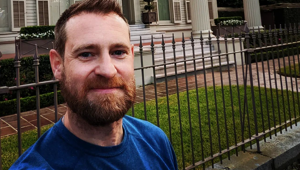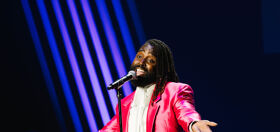 Is there any queer-themed documentary more beloved, more influential, more frequently quoted than 1990’s Paris Is Burning? Director Jennie Livingston’s celebrated chronicle of New York’s underground gender-bending ball culture struck a chord with LGBT audiences like few others. Many of the film’s participants, including the unforgettable Pepper Labeija, Octavia St. Laurent and Willi Ninja met early demises, but their impact lives on in every queen who claims to be serving realness. Author Lucas Hildebrand has added immeasurably to their legacy with his fantastic recently-published book Paris Is Burning: A Queer Film Classic, an academic analysis that helps deepen one’s appreciation for the doc. Hildebrand chatted with Queerty about why we’re still obsessed with these folks almost a quarter century later.
Is there any queer-themed documentary more beloved, more influential, more frequently quoted than 1990’s Paris Is Burning? Director Jennie Livingston’s celebrated chronicle of New York’s underground gender-bending ball culture struck a chord with LGBT audiences like few others. Many of the film’s participants, including the unforgettable Pepper Labeija, Octavia St. Laurent and Willi Ninja met early demises, but their impact lives on in every queen who claims to be serving realness. Author Lucas Hildebrand has added immeasurably to their legacy with his fantastic recently-published book Paris Is Burning: A Queer Film Classic, an academic analysis that helps deepen one’s appreciation for the doc. Hildebrand chatted with Queerty about why we’re still obsessed with these folks almost a quarter century later.
Aside from Grey Gardens and maybe Truth or Dare, there aren’t many documentaries that are so frequently quoted by queer people — or anyone else. Do you think Willi and Pepper and Octavia and the others had any idea that they’d have such an impact on our culture while they were being filmed by Jennie during the mid-’80s?
One of the great ironies — or tragedies — of the film is that so many of its subjects wanted to be famous. A number of the subjects have become iconic, though probably not in the ways that they imaged: they have entered the queer cultural canon rather than becoming famous as models in the fashion industry or as performers. Documentary fame is a different kind of fame than succeeding in one’s trade, and despite the fact that the film’s subjects play to the camera, I don’t think there was probably much of a framework for them to imagine that they could become famous for being themselves more than for their careers. Although they did achieve a certain cultural status, most didn’t really gain the wealth or privilege so often associated with fame, and almost all of the major figures in the film have died young.
 Which of the surviving people documented in the film did you speak with and what are they doing now?
Which of the surviving people documented in the film did you speak with and what are they doing now?
How about we take this to the next level?
Our newsletter is like a refreshing cocktail (or mocktail) of LGBTQ+ entertainment and pop culture, served up with a side of eye-candy.
I was in dialogue with the director and the editor, but I didn’t have a way to access the surviving subjects in the film. Most of the major people documented have died, and those who survive are hard to track down if you only know their House names. Junior Labeija, who is my favorite ball commentator in the film, is still alive and has been more visible at public events after I finished writing but was someone I couldn’t get into contact with while doing the research. A blog has recently identified one of the young kids interviewed in Times Square in the film as Alyssa LaPerla, but I didn’t imagine there was any way to figure out if either of the kids was still alive.
Rather, I did track down all the interviews I could with the film’s subjects from when they were alive and given attention in the popular media. But also, one of the conventions of the independent film industry and particularly of documentary film is that the director does most of the press and speaks for the film more than the films’ subjects. So both then and now, the director Jennie Livingston has been the primary person speaking for the film. But the book is also specifically about the film, rather than the ball community per se. There are other books about the ball scene, most notably Marlon Bailey’s study of the contemporary Detroit ballroom scene, Butch Queens Up in Pumps.
There’s been so much heated discussion recently about the policing of words like “faggot” and “tranny” and some activists have even called RuPaul “transphobic.” How do you think people like Willi and Pepper would respond to being told which words they’re allowed to use?
I consider Dorian Corey to be the most sage of my queer elders, and I imagine that she would have taken the position of “whatever people need to do to live their lives is okay” and wouldn’t have been persuaded by this kind of language policing, but she also probably would have been amused and excited that we’ve come to a point, culturally, where these are becoming prominent public debates. I imagine Pepper might have had a similar response. And Willi always refused claims that the documentary might have exploited him or the ball community — claims that were coming from a liberal political position but that were, more often than not, speaking for rather than from the ball community.
 My own position aligns with Kate Bornstein’s, Justin Vivian Bond’s and RuPaul’s: I think language needs to be flexible, and I think that we need to retain the right to use powerful words, but we also need to be sensitive and strategic in how we use these words and we need to be conscientious in the power that words can have. Language and meanings evolve, and I think it’s been important to have this conversation. But I think silencing or shaming around particular queer uses of language refuses a certain subcultural community legacy and blunts its punk edge.
My own position aligns with Kate Bornstein’s, Justin Vivian Bond’s and RuPaul’s: I think language needs to be flexible, and I think that we need to retain the right to use powerful words, but we also need to be sensitive and strategic in how we use these words and we need to be conscientious in the power that words can have. Language and meanings evolve, and I think it’s been important to have this conversation. But I think silencing or shaming around particular queer uses of language refuses a certain subcultural community legacy and blunts its punk edge.
What do you see as the legacy of the film?
I can’t imagine the world without the film because it seems to be about everything in our culture and to have been so productive for contemporary queer culture. There’s a reason that RuPaul’s Drag Race references it all the time, particularly whenever that show offers a tutorial on gay culture and herstory. The film models what scholars such as José Muñoz have called “queer worldmaking.”
Paris is Burning is currently streaming on Netflix. Watch the trailer below.





















Mezaien
To all the LGBTQ, stand up and let them all have it!. LIFE IS NOT A DICK! IT`S ALWAYS HARD.
Teeth
I’d like to think that they would call out Queerty for being lock-step pussies.
bbg372
“What would the ‘Paris Is Burning’ legends think about ‘Transphobia?'”
What would they think about homophobia? Trans escort, performer, and aspiring model Venus Xtravaganza was openly homophobic in the film. I am curious what their thoughts are about that.
joeyty
I hope the author doesn’t leave out the fact that Dorian Corey kept a dead body at home for years.
hamoboy
That’s kind of a disingenuous question. It’s like “What would suffragettes think of the Bechdel Test” or “What would Confederate slave runaways think of the paper bag test?”. People who are drowning in the ocean are not going to think much about beach conservation. That doesn’t mean beach conservation is unimportant, just that to a drowning person it would be trivial. The question sounds like it’s framed by someone who wants to arrest progress at a particular point, “all this and no more”.